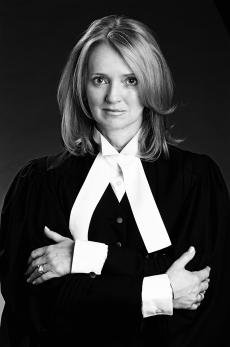 If you are a litigator in Canada you should know the name “Joe Groia”. He is a masterful legal advocate from Ontario who specializes in securities law. His prominence in the legal profession was capped this week when Groia v. The Law Society of Upper Canada (now the Law Society of Ontario) was argued before the Supreme Court of Canada. (Law Society of Upper Canada v. Joseph Peter Paul Groia, 2012 ONLSHP 94)
If you are a litigator in Canada you should know the name “Joe Groia”. He is a masterful legal advocate from Ontario who specializes in securities law. His prominence in the legal profession was capped this week when Groia v. The Law Society of Upper Canada (now the Law Society of Ontario) was argued before the Supreme Court of Canada. (Law Society of Upper Canada v. Joseph Peter Paul Groia, 2012 ONLSHP 94)
Why is Mr. Groia suing Ontario’s Law Society and why would the Supreme Court of Canada agree to hear his case? In June 2012 the Law Society held that Mr. Groia had professionally misconducted himself while defending his client John Felderhof in an action taken against him by the Ontario Securities Commission. You may recall that Mr. Felderhof was second in command at Bre-X Minerals Ltd, the Canadian-owned gold mine in Borneo that turned out to be a fraud, leaving thousands of investors with losses of hundreds of millions of dollars after investing in the bogus company.
Groia’s representation of Mr. Felderhof was second-to-none, as Mr. Felderhof, after 160 days of trial, was acquitted of all charges. However, the Law Society took it upon themselves to call Mr. Groia to account for his allegedly “uncivil” behaviour during the proceedings, conduct so egregious that during the trial, lawyers for the Ontario Securities Commission asked the judge to stop the trial arguing that he had lost jurisdiction by failing to rein in Mr. Groia’s outrageously rude behaviour in the courtroom. That application failed and the trial continued.
Two Ontario courts reviewed and upheld the Law Society’s ruling against Mr. Groia, describing his trial conduct as “unrestrained invective”, excessive rhetoric”, “theatrically excessive”, “sarcastic and petulant”, “more guerrilla theatre than advocacy in court”, and “attacks on the prosecutor’s integrity”.
Nonetheless, it is noteworthy and significant to Mr. Groia’s defence that the trial judge did not hold him in contempt, neither did he report Mr. Groia’s trial behaviour to the Law Society.
Groia, in rebuttal offered the following arguments:
1. He cast no personal aspersions against opposing counsel, but only targeted the Securities Commission and the prosecution;
2. His basis for alleging prosecutorial misconduct was based on his reasonably held views;
3. His language was mischaracterized by the Law Society and the courts;
4. The tone of the trial was an important factor in assessing his conduct, particularly in light of the prosecutor’s behaviour;
5. The Law Society retroactively applied standards of the “civility movement” to his conduct; and
6. His obligation as an effective advocate outstripped any absence of civility.
Without reading the whole of the transcripts of the trial, it is difficult to assess whether Mr. Groia’s behaviour fell so far below the standard of professionalism of a barrister that he ought to have been sanctioned by the Law Society. His original punishment was a two-month suspension of his license to practice law and an order that he pay costs of $250,000. This penalty was later reduced by the courts to a one-month suspension and $200,000 in costs.
Mr. Groia would, of course, argue that even reading the transcripts one would not be in a position to assess the conduct and roles of each of the counsel and judge at the trial and that may very well be true. It’s the old story that “you had to be there” to understand the dynamics.
Media reports from the hearing in the Supreme Court of Canada this week, appear to underscore the high court’s focus on the absence of disapproval from the trial judge, who was best placed to determine whether Mr. Groia’s conduct sunk to a level where he deserved to be chastised or disciplined.
As a trial lawyer in hard-fought cases, I tend to agree that it is not the Law Society’s place to interfere as a back-seat referee in a hotly contested proceeding where an unsuccessful defence will lead to dire consequences for the accused.
The Supreme Court of Canada clearly wants to provide guidance to litigators. We must now wait to see what the Supremes think…
 My sense of justice really comes unglued when I read about another poor schlep who has spent years in prison for a crime he or she did not commit.
My sense of justice really comes unglued when I read about another poor schlep who has spent years in prison for a crime he or she did not commit. Judges hold a special place in the community and are expected to adhere to a set of rules and ethical standards that the average Joe or Jane can choose to ignore. But judges also have their own distinct personalities, biases, attitudes, and ideologies, which they labour to keep in check in order to ensure that justice is both done and seen to be done.
Judges hold a special place in the community and are expected to adhere to a set of rules and ethical standards that the average Joe or Jane can choose to ignore. But judges also have their own distinct personalities, biases, attitudes, and ideologies, which they labour to keep in check in order to ensure that justice is both done and seen to be done.  Two busy family law lawyers in Illinois, Michelle Mosby-Scott and Drew R. Quitschau spent hours sparring in court as opposing counsel on dozens of cases.
Two busy family law lawyers in Illinois, Michelle Mosby-Scott and Drew R. Quitschau spent hours sparring in court as opposing counsel on dozens of cases.  Is discipline in order for an Ontario judge who went shopping wearing a “Make American Great Again” t-shirt? What about a judge sitting in court the day after the American election wearing a baseball cap with the same logo?
Is discipline in order for an Ontario judge who went shopping wearing a “Make American Great Again” t-shirt? What about a judge sitting in court the day after the American election wearing a baseball cap with the same logo? 
